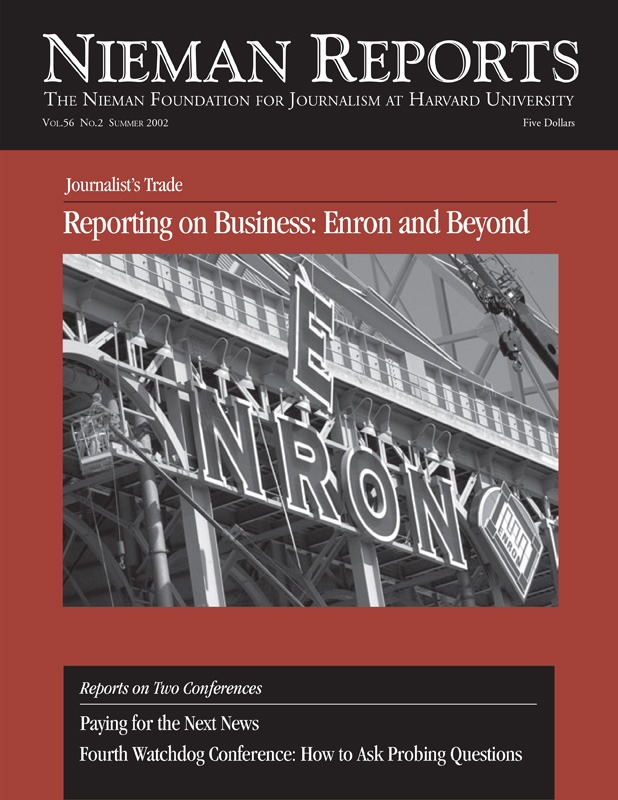
Reporting on Business: Enron and Beyond
Enron’s extraordinary collapse leapt into public view with banner headlines befitting the precipitous fall of a once mighty power. This was a company that not too long before its demise had been the business media’s poster child, praised for its “innovative” practices and consistently listed among the top American corporations. During these heady times, only a few reporters followed leads that eventually took readers past the media’s mostly laudatory words and into the reality of a company whose foundation was crumbling. – Melissa Ludtke, Editor
Should news organizations look for ways to better communicate their business stories to their readers, as well as to other members of the public? And, if so, how do they do a better job of telling these stories? Edited excerpts of comments about this topic follow.

Photo from www.arttoday.com ©2002.
Bob Giles: I’d like to consider what the public learns about the business of news. The cutbacks, buyouts and news hole reductions are extensively reported on and analyzed in our newspapers, in particular. But overlooked in these stories is that most publicly traded news corporations remain highly profitable, even during these tough times. During the first six months of 2001, according to John Morton, a widely respected media analyst, the publicly traded newspaper companies reported operating profit margins averaging 19 percent. This was down from an average of 24 percent a year ago, but by any measure those are robust outputs. The third quarter earnings are below last year, but even in the third quarter there are substantial profits, which is a continuing statement of the fundamental strength of newspapers. Why can’t the newspaper-reading public get a fuller picture of the story about earnings, particularly in a context of continuing high profitability?
Geneva Overholser: Your question goes right to the heart of something we need to do and that is really to bring the public into this discussion. If they were armed with all the information, then we would have potential allies who we don’t have now in figuring our way out of this. It’s a cry of pain, if nothing else, to report these reductions. It’s also a struggle to produce these extraordinary profits, and the decisions we make internally about not advertising much or about putting newspapers at the end of the driveway instead of at the door are things which the public has a significant interest in. And these things we don’t report. And when you try to report them, it’s remarkable how closely held this information is in our business, certainly among newspapers. I wish we could get to a place where CEO’s, who clearly are under an enormous amount of pressure to struggle with this challenge, would feel that it actually was in their interest to be more forthright. One thing is business reporters don’t press enough for it internally. They’re more fearful even than they need to be. But I really wish that would take place.
Marty Baron: I’m not sure that the story isn’t out there. Within certain circles it’s known that media companies make a fair amount of money. Whether the general public is expected to know that, or would know that even if we reported it, I’m not quite sure. Certainly the industry makes good money by comparison with other industries, and yet it’s an industry that faces some substantial struggles, and we can’t deny that. Our circulation has declined, which suggests some fundamental issues that we have to deal with. There’s a public perception that this is somehow a dying industry, a disappearing industry, and that was particularly the case during the Internet era that has passed. Now that all those Internet companies have gone out of business and we’ve survived, maybe there’s a greater sense that we’re going to be around for quite a while and that we’re relatively resilient.
Overholser: I listen to Marty say, fairly casually, “We do tell the story and it’s not clear how well the public really picks it up anyway.” But the fact is we do a paradoxical thing in the way we report on ourselves. We report on cuts, and the public hears about layoffs. And yet we don’t report on our earnings, and I know why we don’t: We don’t want all the advertisers saying to one another, “Goddamn. They’re making 28 percent net income before taxes and they’re charging us this for our advertising?” I mean, it’s not a great story to tell. But one of the paradoxical results is the public thinks we’re struggling when compared with other businesses we’re anything but struggling. But, as Marty points out, we really do have a huge financial challenge. So you would hope that this is a moment when we can change the story. I have a graduate student doing some research on this question of how we present ourselves to Wall Street. It’s not just that we don’t dwell on this glorious story of being so integral to democracy. We actually do less of that. Compared with other companies that see themselves as socially responsible, we do less trying to make the case than many of them do. The question is, can that make any difference? Can you really scale back from the kinds of high profit expectations?
I remember when I was in my mournful, darkest days at the end of being editor of The Des Moines Register and seeing profits just pressed and pressed and pressed. I called John Morton one time and I said, “Couldn’t you sort of plead with the public? After all, they own the stock. You know, there’s a great interest here.” He said, “Are you kidding? It’s pension funds who own the stock. It’s not Jane and Joe Doe, you know.” But, yes, I’d hope there is a story to tell.
Baron: I have a terrible reaction to our sort of moaning in this business a bit. I take very seriously the challenges that we face, but the one thing I don’t want to do is to constantly be writing about ourselves. And it’s probably not within our capacity to change the kinds of pressures that are brought to bear on the industry. These are public companies; they are appealing to these pension funds; they are appealing to Wall Street. They have their demands. They are what they are. To be quite realistic about it, as much as I wish that we were a charity, that we could operate that way, those pressures exist. I can’t do anything about them. I wish they would go away and leave me alone and let us spend more money. I don’t think the solution is for us to write more stories about it, to plead to the public to rise up in rebellion against Wall Street. Because you know what? The public has the same interests as people on Wall Street. They want to see their stock go up. So there isn’t that much of a gap between their thinking.
Eric Newton: It’s a mistake to say “What’s the story?” because there’s never been a story. Events occur that give strength to one school of thought or the other and, since September 11, the world is more serious and sober. And my news consumption has changed—dramatically increased and dramatically increased internationally. The markets will reflect that.

Photo from www.arttoday.com ©2002.
Bob Giles: I’d like to consider what the public learns about the business of news. The cutbacks, buyouts and news hole reductions are extensively reported on and analyzed in our newspapers, in particular. But overlooked in these stories is that most publicly traded news corporations remain highly profitable, even during these tough times. During the first six months of 2001, according to John Morton, a widely respected media analyst, the publicly traded newspaper companies reported operating profit margins averaging 19 percent. This was down from an average of 24 percent a year ago, but by any measure those are robust outputs. The third quarter earnings are below last year, but even in the third quarter there are substantial profits, which is a continuing statement of the fundamental strength of newspapers. Why can’t the newspaper-reading public get a fuller picture of the story about earnings, particularly in a context of continuing high profitability?
Geneva Overholser: Your question goes right to the heart of something we need to do and that is really to bring the public into this discussion. If they were armed with all the information, then we would have potential allies who we don’t have now in figuring our way out of this. It’s a cry of pain, if nothing else, to report these reductions. It’s also a struggle to produce these extraordinary profits, and the decisions we make internally about not advertising much or about putting newspapers at the end of the driveway instead of at the door are things which the public has a significant interest in. And these things we don’t report. And when you try to report them, it’s remarkable how closely held this information is in our business, certainly among newspapers. I wish we could get to a place where CEO’s, who clearly are under an enormous amount of pressure to struggle with this challenge, would feel that it actually was in their interest to be more forthright. One thing is business reporters don’t press enough for it internally. They’re more fearful even than they need to be. But I really wish that would take place.
Marty Baron: I’m not sure that the story isn’t out there. Within certain circles it’s known that media companies make a fair amount of money. Whether the general public is expected to know that, or would know that even if we reported it, I’m not quite sure. Certainly the industry makes good money by comparison with other industries, and yet it’s an industry that faces some substantial struggles, and we can’t deny that. Our circulation has declined, which suggests some fundamental issues that we have to deal with. There’s a public perception that this is somehow a dying industry, a disappearing industry, and that was particularly the case during the Internet era that has passed. Now that all those Internet companies have gone out of business and we’ve survived, maybe there’s a greater sense that we’re going to be around for quite a while and that we’re relatively resilient.
Overholser: I listen to Marty say, fairly casually, “We do tell the story and it’s not clear how well the public really picks it up anyway.” But the fact is we do a paradoxical thing in the way we report on ourselves. We report on cuts, and the public hears about layoffs. And yet we don’t report on our earnings, and I know why we don’t: We don’t want all the advertisers saying to one another, “Goddamn. They’re making 28 percent net income before taxes and they’re charging us this for our advertising?” I mean, it’s not a great story to tell. But one of the paradoxical results is the public thinks we’re struggling when compared with other businesses we’re anything but struggling. But, as Marty points out, we really do have a huge financial challenge. So you would hope that this is a moment when we can change the story. I have a graduate student doing some research on this question of how we present ourselves to Wall Street. It’s not just that we don’t dwell on this glorious story of being so integral to democracy. We actually do less of that. Compared with other companies that see themselves as socially responsible, we do less trying to make the case than many of them do. The question is, can that make any difference? Can you really scale back from the kinds of high profit expectations?
I remember when I was in my mournful, darkest days at the end of being editor of The Des Moines Register and seeing profits just pressed and pressed and pressed. I called John Morton one time and I said, “Couldn’t you sort of plead with the public? After all, they own the stock. You know, there’s a great interest here.” He said, “Are you kidding? It’s pension funds who own the stock. It’s not Jane and Joe Doe, you know.” But, yes, I’d hope there is a story to tell.
Baron: I have a terrible reaction to our sort of moaning in this business a bit. I take very seriously the challenges that we face, but the one thing I don’t want to do is to constantly be writing about ourselves. And it’s probably not within our capacity to change the kinds of pressures that are brought to bear on the industry. These are public companies; they are appealing to these pension funds; they are appealing to Wall Street. They have their demands. They are what they are. To be quite realistic about it, as much as I wish that we were a charity, that we could operate that way, those pressures exist. I can’t do anything about them. I wish they would go away and leave me alone and let us spend more money. I don’t think the solution is for us to write more stories about it, to plead to the public to rise up in rebellion against Wall Street. Because you know what? The public has the same interests as people on Wall Street. They want to see their stock go up. So there isn’t that much of a gap between their thinking.
Eric Newton: It’s a mistake to say “What’s the story?” because there’s never been a story. Events occur that give strength to one school of thought or the other and, since September 11, the world is more serious and sober. And my news consumption has changed—dramatically increased and dramatically increased internationally. The markets will reflect that.
- Martin Baron has been editor of The Boston Globe since August 2001.
- Bob Giles, a 1966 Nieman Fellow, is Curator of the Nieman Foundation.
- Eric Newton is director of journalism initiatives at the John S. and James L. Knight Foundation and founding managing editor of the Newseum.
- Geneva Overholser, a 1986 Nieman Fellow, holds the Curtis B. Hurley Chair in Public Affairs Reporting at the Washington bureau of the University of Missouri School of Journalism.


